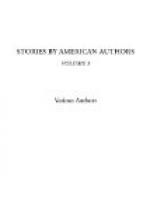Theodore spoke these words with a face which I have never seen him wear—a fixed, mechanical smile; a hard, dry glitter in his eyes; a harsh, strident tone in his voice—in his whole physiognomy a gleam, as it were, a note of defiance. Now I confess that for defiance I have never been conscious of an especial relish. When I am defied I am beastly. “My dear man,” I replied, “your sentiments do you prodigious credit. Your very ingenious theory of your present situation, as well as your extremely pronounced sense of your personal value, are calculated to insure you a degree of practical success which can very well dispense with the furtherance of my poor good wishes.” Oh, the grimness of his visage as he listened to this, and, I suppose I may add, the grimness of mine! But I have ceased to be puzzled. Theodore’s conduct for the past ten days is suddenly illumined with a backward, lurid ray. I will note down here a few plain truths which it behooves me to take to heart—commit to memory. Theodore is jealous of Maximus Austin. Theodore hates the said Maximus. Theodore has been seeking for the past three months to see his name written, last but not least, in a certain testamentary document: “Finally, I bequeath to my dear young friend, Theodore Lisle, in return for invaluable services and unfailing devotion, the bulk of my property, real and personal, consisting of—” (hereupon follows an exhaustive enumeration of houses, lands, public securities, books, pictures, horses, and dogs). It is for this that he has toiled, and watched, and prayed; submitted to intellectual weariness and spiritual torture; accommodated himself to levity, blasphemy, and insult. For this he sets his teeth and tightens his grasp; for this he’ll fight. Dear me, it’s an immense weight off one’s mind! There are nothing, then, but vulgar, common laws; no sublime exceptions, no transcendent anomalies. Theodore’s a knave, a hypo—nay, nay; stay, irreverent hand!—Theodore’s a man! Well, that’s all I want. He wants fight—he shall have it. Have I got, at last, my simple, natural emotion?
21st.—I have lost no time. This evening, late, after I had heard Theodore go to his room (I had left the library early, on the pretext of having letters to write), I repaired to Mr. Sloane, who had not yet gone to bed, and informed him I should be obliged to leave him at once, and pick up a subsistence somehow in New York. He felt the blow; it brought him straight down on his marrow-bones. He went through the whole gamut of his arts and graces; he blustered, whimpered, entreated, flattered. He tried to drag in Theodore’s name; but this I, of course, prevented. But, finally, why, why, WHY, after all my promises of fidelity, must I thus cruelly desert him? Then came my trump card: I have spent my last penny; while I stay, I’m a beggar. The remainder of this extraordinary scene I have no power to describe: how the bonhomme, touched, inflamed, inspired, by the thought of my




